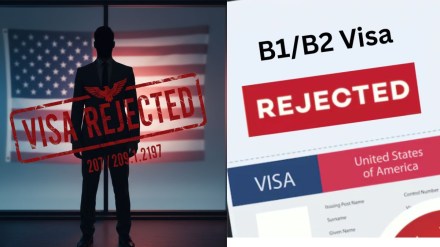For many, securing a B1/B2 visa to attend a conference or engage in business activities in the United States seems like a straightforward process, especially if you have a solid background in international travel, a reputable business, and a history of financial stability.
However, for a marketing firm CEO, the dream of attending a business conference in Las Vegas turned into a reality check after facing a visa refusal. He has visited over 20 countries, has been running the firm over a decade and has a steady income, but his dreams were quashed.
What happened during the interview?
The CEO applied for a B1/B2 visa to attend a 3-day business and marketing conference in Las Vegas, scheduled for January 2026. The event was a key opportunity for networking and learning, essential for staying ahead.
The trip was to last from January 8th to January 20th, with the conference itself taking place from January 12th to 14th.
He shared all details in the DS-160 form, including the funding source and an impressive travel history of over 20 countries, spanning Europe, Japan, and beyond.
They had also attended a similar conference in Hungary just the month before. With a well-established proprietorship marketing firm operating for 8 years, the applicant was confident that their credentials would speak for themselves.
Right from the beginning, the officer’s questions were straightforward and systematic. The exchange went as follows:
Officer: What is the purpose of your visit to the US?
Applicant: I’m attending a business conference to network and participate in learning sessions.
Officer: How long do you plan to stay?
Applicant: I’ll be there from January 8th to 20th. The conference itself is from January 12th to 14th.
Officer: Have you traveled internationally before?
Applicant: Yes, I’ve been to over 20 countries. Just last month, I was in Hungary for a similar conference.
Officer: Are you traveling by yourself or with your company?
Applicant: I run a marketing firm that provides digital marketing services to clients.
(The officer cuts in here.)
Officer: Let me clarify. Are you traveling on behalf of your company?
Applicant: Yes, I run the company. It’s my own business.
Officer: How long has the company been operating?
Applicant: It’s been 8 years.
Officer: What is your salary?
Applicant: I take home about ₹2 lakh per month.
What is 214(b) refusal?
The 214(b) refusal is one of the most common types of visa rejections. It is typically issued when the consular officer believes the applicant has not demonstrated sufficient ties to their home country or might be intending to immigrate to the US rather than focusing on the merits of the trip, such rejections are often based on the applicant’s ability to show strong enough social, economic, and professional connections to India to assure their return after the trip.
‘Answer only to the question’
Netizens explained the possible reason for the rejection. A user noted, “The counsellor asked you twice – ‘Are you going on behalf of your company?'” Your answer both times was that I run the company. Was the question not clear to you? The answer was yes, I’m travelling on behalf of my company. The decision was probably made by the end of this question. If one can’t comprehend a simple question , what’s the point of attending a conference in US with native speakers? That’s the thought that crossed me.”
Another added, “Not sure if it would’ve helped; it seems like the officer made up their mind at the beginning, but you should’ve said this: ‘3 times EU, 2 times Japan, and others.'” Instead of saying, “I was in Hungary last month for a similar conference.” They care about your overall travel pattern and if you return home responsibly. Also, why would you even mention you went to a “similar” conference before??? That would make it sound like it wouldn’t be a big deal if you missed this one.”
“Your answers, bro, they’re not right and feel shady somehow or make you seem desperate even to me when I’m an ordinary guy. You say only what they ask for, no flex, no oversharing, and pinpoint clear things required, as your DS 160 has the word limits until they ask you further. I believe that’s why they take interviews; Schengen will give you a handy, or anyone else, but the US won’t,” added a user.
“Your answers clearly indicated your intention to get business from US (without your business being present in US) which is a red flag,” opined another.
(This story is based on a post shared by a social media user. The details, opinions, and statements quoted herein belong solely to the original poster and do not reflect the views of Financialexpress.com. We have not independently verified the claims.)
